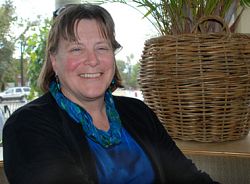Enrique Olivares

"Here we see what compassion means. It is not a bending toward the underprivileged from a privileged position; it is not a reaching out from on high to those who are less fortunate below; it is not a gesture of sympathy or pity for those who fail to make it in the upward pull. On the contrary, compassion means going directly to those people and places where suffering is most acute and building a home there."
from "Compassion - A Reflection on the Christian Life"
by Nouwen, McNeill, and Morrison
DRAPER — Lawyer Barbara Szweda has done her share of corporate law work. She’s argued on the side of the wealthy and the prosperous. But her need for that vague, "something more" led her away from corporate law and into teaching and immigration law. It was among her idealistic students and the neediest of immigrants from Rwanda, Honduras, El Salvador, and other developing countries that she met Jesus, she said.
A featured speaker at the Diocese of Salt Lake City’s 45th Annual Pastoral Congress, Szweda spoke of "Encountering Jesus In The Lives of the Poor," and her emotional presentation inspired workshop participants to share their own stories.
Her transformation from a childhood faith to a more mature, educated, "faith in action" came in high school as she studied under the School Sisters of Notre Dame.
"The best teacher I’ve ever had was Sister Charlamaigne, who formed a group called the Young Apostles," Szweda said. "Sr. Charlamaigne changed our perspectives. She made me want to work for the poor. But in law school we weren’t really trained to work with the poor. Even at Notre Dame School of Law there were few education courses, and none that taught how to work with the poor."
Szweda and other instructors began teaching courses in poverty law, "and our students taught us. In the way they reached out to the poor, they taught us how Christ calls each of us to servanthood."
Teachers and students alike began doing "pro bono" work (work without pay) for people on the fringes of society, "and we learned there are thousands of people in society who are one catastrophe, one illness, one lost job, or one accident away from complete failure.
Szweda said radical servanthood allowed her to see God himself in the humility and poverty of those they served.
Drawing from the Beatitudes, Szweda said the Kingdom of God will belong to the poor, and cited her clients for their courage.
"We found God in our suffering clients whom we found to be holy and full of grace.
Szweda told some of her clients’ stories, like the heavily scarred man from Honduras whose commanding officers made him wall through a mine field because he found he could not kill anymore and declared himself a Christian; and the Rwandan woman who at 16 years old had seen her whole family killed. She escaped on foot to Congo, a trek that killed 800,000 people in 100 days. She returned to Rwanda as an adult, and was sent to the United States by a friend.
"Although I’d never contacted the Red Cross before, I called them and asked them to look for her mother," said Szweda. "Eight months later, we got a call from the Red Cross, and they’d found her mother who, remarkably, had not been killed.
"When we made the call that reunited the mother and daughter I felt I knew how Mary and Martha felt when Jesus brought Lazarus back from the dead."
Quoting Henri Nouwen, Szweda said Christians are called to either be on the cross or at the foot of the cross.
"That is what compassion means," she said. "And it is with compassion that we must deal with the immigrants of today. They face enormous challenges, and if we truly see people made in the image and likeness of God, then we must go where they are and see God in their lives.
Szweda said many of the young immigrants in the U.S. now were brought here as children and have no knowledge of the countries in which they were born.
"Attempts to send these young people back to their home countries would be plunging them into a society that is completely strange to them. Many of them can’t even speak the language of their home countries."
Szweda said after years of teaching at the University of Notre Dame and time spent in Utah, she still carries with her four drawings immigrant children drew of their native villages.
"There is no clear-cut answer to the immigration issue," she said. "We have to see Lazarus in these people. It is so important for us to hear and use their stories - they teach us that Christ is alive in our everyday lives. We just have to look and reach out to him.
© Copyright 2025 The Diocese of Salt Lake City. All rights reserved.

Stay Connected With Us